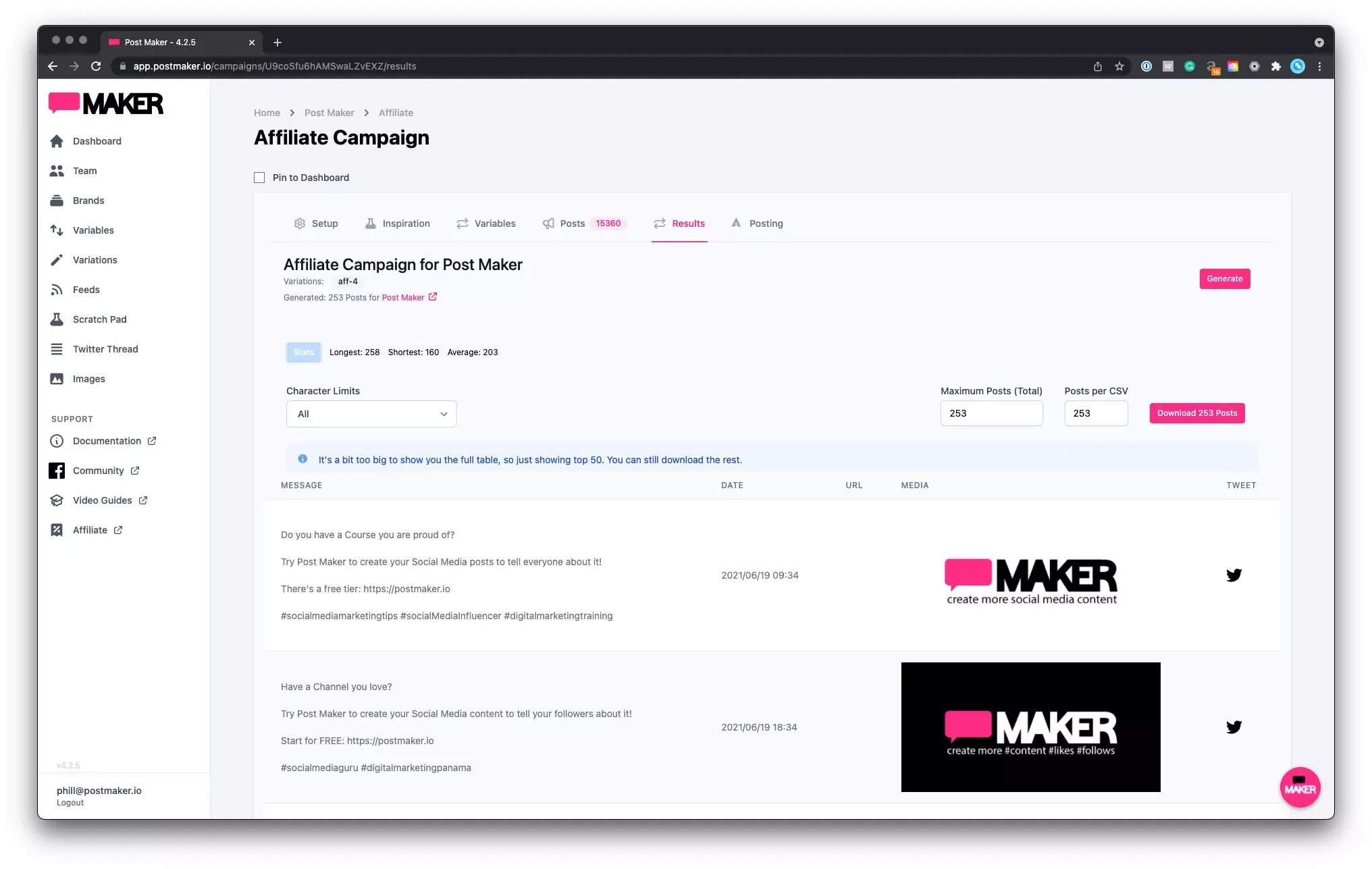A blog about...
Small Business and Social Media: A Guide to Connecting With Your Audience
Small businesses are the backbone of any economy, and their success is crucial for a region’s overall health and growth.
These businesses, typically defined as having fewer than 500 employees, often face unique challenges and may have limited resources compared to larger corporations that have a huge marketing team behind them.
However, with the widespread use of social media, small businesses and business owners now have access to a powerful and low-cost marketing and advertising platform.
In fact, 71% of small-to-mid-sized businesses use social media to market themselves, and 52% post once a day.
Source: blog.hootsuite.com
Social media has become an integral part of modern life, with billions of people around the world using platforms such as Facebook, Twitter, Instagram, and LinkedIn to connect with others and stay up-to-date on the latest news and trends.
In this article we will look at some of the ways to boost your Social Media Presence and why it could be useful to support your existing customer base and help reach prospective customers.
What are the benefits of social media marketing for small businesses?
For small businesses, social media provides a unique opportunity to reach a wider audience and target specific demographics, increase brand awareness and customer engagement, and gather valuable customer feedback and insights.

Low-cost marketing and advertising
Social media provides a low-cost platform for small businesses to promote their products and services.
Increased brand awareness
Small businesses can increase their visibility and reach by regularly posting engaging content and interacting with customers on social media.
According to data gathered by SCORE, 77% of small businesses use social media to help build brand awareness, facilitate customer service, and increase revenue.
Source: business.com
Customer engagement
Social media provides a personal and interactive way for small businesses to connect with their customers, which can help to build trust and loyalty.
Reach a wider audience
With billions of people using social media worldwide, small businesses have the opportunity to reach a wider audience and target specific demographics.
Improved customer service and support
Social media allows small businesses to quickly and efficiently respond to customer inquiries and complaints, which can improve overall customer satisfaction.
Gather valuable customer feedback and insights
By tracking and analyzing customer interactions on social media, small businesses can gain valuable insights into what their customers want and how they can improve their products and services.
Where should you focus your Social Presence?
Here are the main players and how their audience might be good for you

Facebook: With over 2.7 billion monthly active users, Facebook is the largest and most diverse social media platform. It is popular with older users and those who use it to connect with friends and family. Small businesses can benefit from using Facebook by creating a business page and using it to share updates, interact with customers, and run paid advertising campaigns.
Instagram: With over 1 billion monthly active users, Instagram is a visually-focused platform that is popular with younger users and those interested in fashion, art, and design. Small businesses can benefit from using Instagram by sharing visually appealing content, utilizing hashtags, and engaging with customers through comments and direct messages.
Twitter: With over 330 million monthly active users, Twitter is a microblogging platform that is popular for real-time news and information. It is used by a wide range of users, including individuals, businesses, and media outlets. Small businesses can benefit from using Twitter by sharing updates, interacting with customers, and participating in relevant online conversations.
LinkedIn: With over 740 million users, LinkedIn is a professional networking platform that is popular with job seekers and professionals. Small businesses can benefit from using LinkedIn by creating a company page and using it to share updates, interact with customers and industry professionals, and post job openings.
TikTok: With over 500 million monthly active users, TikTok is a short-form video platform that is popular with younger users and those interested in creative content. Small businesses can benefit from using TikTok by creating short, creative videos that showcase their products or services.
What sort of thing should a small business include in their social media marketing strategy?
For small businesses, having a successful social media marketing strategy is integral to their success. To ensure they make the most out of their efforts, there are certain key steps that need to be taken into consideration.

Define your goals
Clearly define what you hope to achieve through your social media marketing efforts, such as increasing brand awareness, driving website traffic, or generating leads.
Identify your target audience
Determine who you are trying to reach through your social media marketing efforts and consider factors such as demographics, interests, and behaviors.
Choose the right social platforms
Select the social media platforms that are most relevant to your target audience and business goals.
Create a content strategy
Develop a plan for creating and sharing engaging content on social media that aligns with your business goals and resonates with your target audience with relevant content.
Engage with your audience
Regularly interact with your followers on social media, respond to comments and messages, and encourage user-generated content.
Use paid advertising
Consider using paid advertising options on social media platforms to reach a wider audience and achieve specific business goals.
Analyze and optimize
Use analytics tools to track and measure the performance of your social media efforts, and make adjustments as needed to optimize your strategy.
What content can a small business post on its Social Media Platforms?

There are many types of content that small businesses can share on social media, including:
Blog posts
Sharing links to your company blog or industry-related articles can help to showcase your expertise and provide valuable information to your audience.
Additionally, you can repurpose your existing blog posts into social media updates. Rather than posting the entire article, you could post snippets or quotes in a tweet/post, along with a link to the full post. This allows you to share more content with minimal effort, while raising awareness of your company blog. Repurposing content is an effective way to maximize the impact of your blog posts on social media.
Product updates and promotions
Use social media to announce new products, sales, and special promotions.
Giving incentives for people to follow your social media accounts can be an effective way to attract more followers and get the word out about your products. You could offer discounts, exclusive access to new products, or other rewards that incentivize customers to follow your social media.
Additionally, providing giveaways or drawings that give away something related to your brand can help boost engagement and spread awareness of your business.
Behind-the-scenes content
Sharing glimpses into your company culture and day-to-day operations can help to humanize your brand and build a connection with your audience.
Sharing behind-the-scenes content can also provide social proof that your small business is credible and trustworthy.
User-generated content
Encourage customers to share photos or reviews of your products on social media and repost their content to showcase your satisfied customers.
To further encourage customers to post user-generated content, you can create an incentive program. This could be a discount code or reward system that encourages customers to post reviews or photos with your brand hashtag. Not only will this result in more user-generated content, but it can help increase brand recognition as well.
Industry news and trends
Sharing news and updates from your industry can help to position your business as a thought leader and keep your audience informed.
Making sure that the information you post is accurate, relevant, and timely will help ensure that users engage with your posts and stay informed about what is going on in the industry.
Interactive content
Creating polls, quizzes, and other interactive content can help to engage your audience and encourage them to interact with your brand.
Ask questions that allow your followers to comment or tag their friends, offer polls and surveys, or post interesting graphics that capture people’s attention. These interactive elements help make your content more visible and increase interaction from your followers.
We also have a blog post about Social Media Interaction Posts
Additionally, results from interactive content such as polls and quizzes can provide valuable insights into customer preferences, which can be used to tailor content towards your target demographic in the future.
Visual content
Photos, videos, and other visual content tend to perform well on social media and can help grab your audience’s attention.
When creating your visual content, make sure it stands out from the other posts in a user’s feed and works to stop them scrolling. This could mean incorporating moving images and videos rather than static photos, original artwork or GIFs to draw attention, vivid colors, contrasting text and visuals, as well as stunning photography or product shots. Adding a sprinkle of humor also helps increase engagement with audiences on social media platforms.
Customer Testimonials
Customer testimonials are one of the most powerful forms of social proof. When potential customers are considering making a purchase, they often want to hear from someone who’s already used the product or service. Hearing positive feedback gives them comfort, which is why it’s so important for businesses to share customer reviews and ratings on their social networks and websites.
It’s important to mix up the types of content you share and consider what will be most relevant and engaging for your target audience.
Ideas for how small businesses can make the most out of social media
To effectively use social media, small businesses should define their potential customers and choose the right Social Media Platforms. For example, a B2B company might find LinkedIn the most effective platform, while a B2C company might succeed more on platforms like Facebook or Instagram. It’s also important to create a content strategy and regularly post engaging content that resonates with your target audience.
Using Hashtags
Utilizing hashtags and participating in relevant online conversations can also help to increase visibility and reach.
There are several ways for a small business to find relevant hashtags for their social media posts:
-
Use a hashtag research tool: There are various tools available that allow you to search for and discover popular and relevant hashtags, such as Hashtagify, RiteTag, and Keyhole.
-
Check out what competitors and industry leaders are using: Take a look at what hashtags your competitors and industry leaders use on their social media posts. This can give you a good idea of what is popular and relevant in your industry.
-
Consider using branded hashtags: Creating a branded hashtag specific to your business can help increase brand awareness and make it easier for customers to find and engage with your content.
-
Use hashtags that align with your business’s values and mission: Choose hashtags that reflect your business’s values and mission, as this can help to attract like-minded customers and build a community around your brand.
-
Look at trending hashtags: Keep an eye on trending hashtags on platforms like Twitter and Instagram, and consider using them if they are relevant to your business and audience.
Using Images
Using images to go alongside your Social Media Content doesn’t need to be too complicated.
When used well, images can be a great way to boost your online brand awareness. Images that are visually interesting and branded with your logo or brand color pallet will help establish a consistent look for your posts and will create recognition for your business down the line.
In addition, you can take advantage of the free stock photo resources out there to create images in your own unique style. Not only will these images boost brand awareness but they’ll also make for more engaging content, just make sure you follow their guidelines for using commercially or with/without attribution
-
Pexels: Pexels is a website that provides a wide selection of high-quality, royalty-free photos that can be used for personal or commercial purposes.
-
Unsplash: Unsplash is a website that offers a vast collection of beautiful, high-resolution photos that are free to use for any purpose.
-
PIXABAY: Pixabay is a website that offers a variety of free images, including photos, illustrations, and vector graphics that can be used for personal or commercial purposes.
-
StockSnap: StockSnap is a website that provides a large selection of high-quality, royalty-free photos that can be used for personal or commercial purposes.
-
Canva: Canva is a graphic design tool that offers a library of free images and templates that can be used to create social media graphics and other visual content.
It’s worth giving Canva an extra special mention here as it’s taken the internet by storm for it’s easy way to create graphics for the web.
User Generated Content
Another important social media aspect for small businesses is leveraging user-generated content and reviews. Encouraging customers to post about their experiences with your business on social networks can help to build trust and credibility.
Additionally, responding to both positive and negative reviews in a timely and professional manner can help to improve customer service and support.
Tracking the performance of your Social Channels
To track and measure the performance of your social media efforts against your Social Media Strategy, it’s essential to use analytics tools to see how your content is resonating with your audience, who are your active users, and which social media channels are working for you. This can help you to understand what is working and what isn’t and make adjustments as needed.
With the help of analytics, you can track and monitor important metrics such as website clicks, engagement levels, post reach, impressions, share of voice and more. You can also get an insight into who your active users are and what kind of content your audience prefers to engage with. All this information is invaluable in understanding exactly how your social media efforts are performing and will help you make informed decisions about what type of content you should produce in order to maximize engagement levels on your channels.
Tracking Analytics shouldn’t be too tricky, as most platforms have their way of doing it. You may need a specialist tool if you want an overall view across all Social Media Platforms.
- Twitter Analytics: https://analytics.twitter.com/
- Facebook / Instagram: https://business.facebook.com/latest/insights/overview
- LinkedIn: Navigate to your company page, and click “Analytics”
- TikTok: go to your profile, tap the three dots, select “Creator tools”, and then choose “Analytics.”
- Google My Business: https://business.google.com/
If you want to see some aggregation tools, the people over at Sprout Social have created a post about it - 10 of the best social media analytics tools for marketers.
Use a Social Media Scheduler
Social media schedulers are a great tool for small businesses to use when managing their social media accounts
Benefits of a Scheduler
A social media scheduler can help you plan ahead and save time by drafting several posts all at once and scheduling them to post automatically. This will free up more of your day-to-day time that would have been spent on manual posting.
Save time
A social media scheduler allows you to schedule and automate your social media posts in advance, saving you time and effort in the long run.
Take into account relevant holidays and events that could be related to your brand and create content for those as well. This will help ensure that all your posts are timely and relevant, helping you save even more time in the long run.
Consistency
A scheduler can help you to maintain a consistent posting schedule, ensuring that you are regularly providing fresh content to your followers.
It’s also a good idea to identify the best times to post, based on when your audience is most likely to be online. By timing your posts correctly, you can maximize your engagement and make sure more of your followers see the content. Try experimenting with different times of day or days of the week, and use data from your analytics to determine when posting yields the best results.
Increased efficiency
By scheduling posts in advance, you can batch your social media efforts and be more efficient with your time.
Better organization
A scheduler can help you to stay organized and keep track of your social media efforts, making it easier to plan and execute your strategy.
Improved engagement
By scheduling posts at times when your audience is most active, you can increase the chances of your content being seen and engaged with.
Choosing a Social Media Scheduler
There are lots of Social Media Schedulers available we have a list of the ones we support at PostMaker on our Social Media Schedulers page.
Different social media schedulers offer support for different platforms so make sure that your chosen scheduler supports the platform you plan on using.
Common challenges faced by small businesses on social media
While social media can be a powerful tool for small businesses, it’s important to be aware of the common challenges that can arise.

One of the biggest challenges faced by small businesses on social media is the lack of time and resources. Running a small business can be time-consuming, and it can be not easy to find the time to manage social media presence and create engaging content actively.
Many small business owners are not familiar with the features and capabilities of each platform, which can lead to ineffective strategies and a lack of engagement from their target audience. To overcome this challenge, small businesses should take the time to learn about each platform and develop an effective strategy that works for them.
Another challenge is the difficulty in creating and maintaining a solid online presence. With so many businesses competing for attention on social media, it can be difficult to stand out and get noticed. To improve your online presence, it’s important to regularly post high-quality content, engage with your audience, and utilize paid advertising options if necessary.
Protecting your business’s reputation online is a common concern for small businesses on social media. Negative comments and reviews can damage your reputation, and it’s important to have a plan in place to address any issues that may arise. Responding to negative comments in a timely and professional manner and showing that you are willing to resolve any problems can help to protect your reputation and maintain customer trust.
According to research from Convince & Convert, 42% of consumers expect a response to a complaint on social media within 60 minutes, and nearly one-third expect a response within half an hour.
Source: businessnewsdaily.com
It can be difficult to objectively measure the impact of your social media activities on revenue, which can make it difficult to justify spending money and time on these platforms. To maximize the potential, small businesses should focus on metrics that are more closely linked to revenue such as website traffic, lead generation, and sales conversion.
Conclusion
In conclusion, social media is essential for small businesses looking to increase brand awareness, engage with customers, and reach a wider audience. By defining your target audience, creating a content strategy, and utilizing analytics tools, small businesses can effectively use social media to their advantage. While there may be challenges, the benefits of using social media for small businesses far outweigh any potential drawbacks. Small businesses should embrace social media and incorporate it into their marketing efforts to stay competitive in today’s digital world.
Ready to dive in?
Try it at no cost.
Make your day significantly better and check out PostMaker today.



